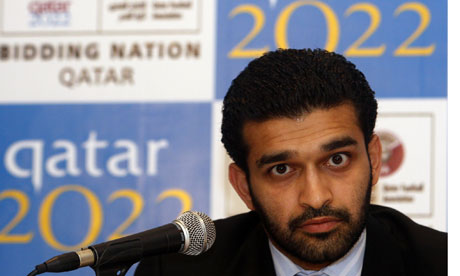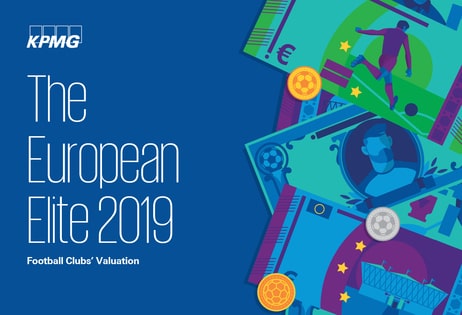The head of Qatar's winning bid to host the 2022 World Cup has hit back furiously at the allegations of corruption levelled against his bid, saying there is "not a shred of evidence" to support them.
In an exclusive first newspaper interview since Fifa awarded Qatar the right to host the World Cup on December 2, Hassan al-Thawadi, the bid's chief executive, argued that the suspicion and allegations against the bid are fuelled partly by anti-Arab prejudice.
"I do not believe these claims are being made out of racism," Thawadi said, speaking to the Guardian in Doha, the Qatari capital. "But I genuinely think that ignorance fed into prejudice and made it a more fertile ground for these rumours to take seed and grow. I do believe there is prejudice against the fact that we are a rich, Arab nation – yes, I think there is genuine prejudice there."
Acknowledging that he was awarded a huge budget from Qatar's government to market and support the bid – although he adamantly refused to reveal its true figure – Thawadi insisted the bid was conducted cleanly. He said he had considered establishing an independent investigation, and was going to ask Lord Coe, whose reputation for integrity is high at Fifa, to chair it, but decided there was no reason why he should and it would be unworkable.
"I said to Mike Lee [the English consultant to the Qatar and London 2012 Olympic bids] I wanted to approach Seb Coe to be chairman of that committee. But in the end, why do I have to prove my innocence when there is not a shred of evidence? Why should we have an investigation if no other country has one, even Russia, which won the 2018 World Cup by the same people on the same day after the same process?"
Thawadi was critical of the House of Commons select committee for culture, media and sport for publishing with parliamentary privilege the most damaging accusation against Qatar, that three African Fifa executive committee members were paid $1.5m (£0.94m) to secure their votes. That allegation was supplied to the committee by the Sunday Times, which had not published it, saying it was based on information from "a whistleblower who had worked with the Qatar bid", and warning that the allegation was unproven. Without giving the bid any notice or inquiring about the story's validity, the select committee published it, allowing the allegation to be reported protected by parliamentary privilege.
The select committee did then publish Qatar's response, saying the story had been "fabricated" by a former member of staff with "an axe to grind", but Thawadi believed it was an unfair use of parliamentary privilege to publish the allegation without any evidence supporting it.
On Sunday the whistleblower retracted her story, publicly identifying herself as Phaedra Almajid, formerly the Qatar bid's international media specialist, who said she had done it to "hurt" the bid after she was removed from her job in March 2010. Thawadi and his team have been in close touch with her, and facilitated a conversation with the Guardian in which she retracted her story. Both she and Thawadi said the bid team did not threaten or pressure her or offer her any inducement.
John Whittingdale, the chairman of the select committee, has defended the publication, saying the committee did so because Fifa would not investigate. However, at that point, the Sunday Times had not yet presented Fifa with the allegation.
"I do feel absolute surprise and disappointment," Thawadi said. I understand and respect parliamentary privilege, but my country's reputation and my bid's reputation is being sullied, tarnished, because of these allegations."
Thawadi said he was also "disappointed" by the statement revealed in a leaked email by Jérôme Valcke, Fifa's general-secretary, that Qatar "bought the World Cup". Thawadi said the bid had immediately sent Valcke a strong condemnatory letter reserving the right to sue him, and Valcke issued a clarification, saying he had been referring to Qatar's large budget, not alleging corruption.
Thawadi, in a long interview and several further discussions, pleaded for Qatar's bid to be considered "on merit" and the value of hosting the World Cup in the Middle East.








































